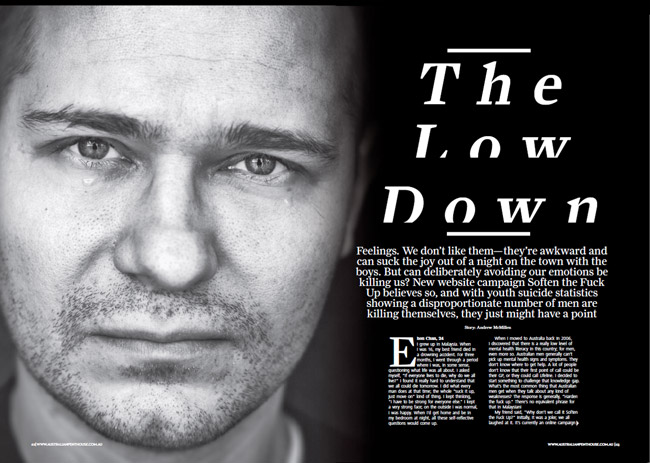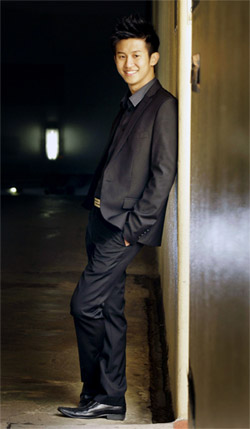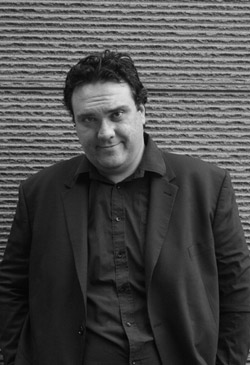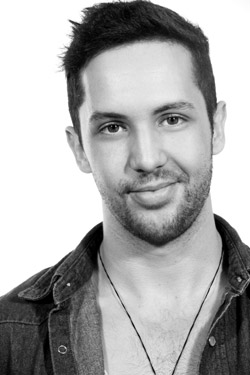The Weekend Australian album reviews, September 2012: The Presets, We All Want To, Sugar Army
Three album reviews for The Weekend Australian, published in September. The first is a feature review of 490 words; the other two are regular 260-worders.
++
Four years between albums is plenty of time for younger competitors to snatch the crown from Australia’s electronic music kings.
The Presets’ top spot was earned after 2008’s Apocalypso, which spawned multi-platinum sales, ARIA awards and one world-conquering single in ‘My People’.
Now in their mid-30s, Sydney-based Julian Hamilton and Kim Moyes have exchanged nightclubs for parenthood. One may assume they’ve lost touch with the culture that spawned this synth-and-drums duo and their stunning 2005 debut, Beams.
All doubts are vanquished within the first few bars of the first single, ‘Youth in Trouble’. The six-minute track is built on an insistent bass pattern, on top of which Hamilton – in typical piss-taking vocal style – parodies the media-led hand-wringing on behalf of Australian parents.
“Up out all night in bright-lit wonderland . . . With a music taste abominable / Man, I’m worried sick for youth in trouble.” The layered irony is wonderful: moments later, the track fills with the kind of electronic noise and subterranean bass that’d piss off parents when played loud. As it should be.
This track is a departure from the clear, concise vocal hooks that have characterised the Presets’ past hits. It’s a perfect album opener because Pacifica bears little resemblance to their previous two releases. These 10 tracks are more electronica than dance music; to use an obvious party-drug analogy, it’s more 5am comedown than 1am peak. At first, Pacifica‘s incongruity is a tough pill to swallow.
The lack of obvious singles is troubling — the sea-shanty-like ‘Ghosts’ is the most accessible track here — as is the apparent dearth of vocal and melodic hooks. This jars with popular understanding of who the Presets are, and what they represent. It takes me about six listens to accept this record for what it is, not what it could have been if they had continued to follow their own songwriting formula. Impatient, dismissive fans will miss out on the Presets’ most accomplished and mature album yet.
Pacifica sees the pair bower-birding from a wide range of aural sources: shades of dance titans Underworld and Sonicanimation are occasionally detectable, as well as more modern electronic acts such as Crystal Castles and the Knife.
The latter influence is particularly strong in track seven, ‘Adults Only’, which sees Hamilton pitch-shifting his vocals to a deep tone, as if trying to obscure his identity. This song is the album’s emotional and artistic peak; a punishing acid-house pastiche led by stuttering, hornet-swarm synths.
Inspired by John Birmingham’s Leviathan, Hamilton’s dark lyrics take in Sydney’s murderous past and uncertain future: “Children don’t you know that we’re living in a city that’s built on bones?” he sings in the chorus; later, he mentions frail old ladies dying afraid and alone while surrounded by yuppies, small bars and coke.
Ultimately, Pacifica is the sound of two men who understand Australian pop culture better than anyone. ‘Zeitgeist’ is a dirty word, but there’s no doubt the Presets have produced a record that sounds simultaneously of-the-moment and futuristic. The crown remains intact.
LABEL: Modular/UMA
RATING: 4 stars
++
We All Want To – Come Up Invisible
This is a messy album in the best way possible. The music created by Brisbane four-piece We All Want To swings back and forth between charming indie pop and rock with jagged edges.
Led by a pair of singer-guitarists in Tim Steward – who also fronted 90s-era Brisbane noise-pop act Screamfeeder — and Skye Staniford, the interplay between the two is the chief highlight here. Both are accomplished writers with a knack for clever wordplay and memorable melodies.
They opt for some artistic decisions that simply wouldn’t work in less capable hands – like opening the album with a sprawling, seven-minute track that features an off-key recorder solo — yet these four pull off such curiosities with style. The band’s self-titled debut, released in 2010, was a solid set containing a pair of stand-outs in ‘Japan’ and ‘Back to the Car’.
It’s a similar story here: special mentions belong to Steward’s compelling, life-spanning narrative in ‘Where Sleeping Ends’; and ‘Shine’ by Staniford, which begins with subdued instrumentation and ends with a whirlwind of beautiful harmonies. There are no ongoing lyrical themes to speak of, nor is there much sense of cohesion between these 11 tracks, but these absences don’t matter: there’s not a weak track here. This collection is accomplished, unpretentious and unassuming.
We All Want To is no spring chicken. Steward has been playing live for more than two decades and this is the 11th album he has been involved in. Come Up Invisible is a nod to the virtues of banking on earned musical wisdom and experience.
LABEL: Plus One Records
RATING: 3 ½ stars
++
Through change comes artistic progress. On its second album, Perth-based rock act Sugar Army has streamlined the sound out of necessity: the band’s bassist joined fellow Perth group Birds of Tokyo, reducing the quartet to a trio.
Yet this departure has helped to hone Summertime Heavy into a set of compact, driving rock songs. Sugar Army’s 2009 debut, The Parallels Amongst Ourselves, was memorable but a touch overlong; half the tracks were great, the others less so.
Here, the band has scaled back the atmospheric production in favour of muscular songwriting, and the results are impressive. Sugar Army’s sound evokes Los Angeles act Silversun Pickups in that the guitar phrasing, bass lines and drumbeats are all independently interesting.
This clever musical interplay, coupled with Patrick Mclaughlin’s distinctive voice, ensures they’re a near-perfect unit. Mclaughlin has a unique turn of phrase, too: “Once the mind’s made up / Nothing comes in, and nobody gets out”, he sings in ‘Small Town Charm’, which nails the realities of some regional mentalities.
In standout album closer ‘Brazen Young’ he continues his fascination with female-led narratives first noted on their debut. These are lean, well-written songs delivered forcefully and urgently.
The band is versatile, too: the title track is built around a pretty acoustic guitar progression and a chanted motif (“Summertime heavy is taking its toll”), while the appearance of a wood block in ‘Hearts Content’ is both unexpected and welcome. As the Go-Betweens’ Robert Forster has said, the three-piece band is the purest form of rock ‘n’ roll expression. That holds true here.
LABEL: Permanent Records
RATING: 3 ½ stars

 I grew up in Malaysia. When I was 16, my best friend died in a drowning accident. For three months, I went through a period where I was, in some sense, questioning what life was all about. I asked myself, “If everyone lives to die, why do we all live?” I found it really hard to understand that we all could die tomorrow. I did what every man does at that time; the whole “suck it up, just move on,” kind of thing. I kept thinking, “I have to be strong for everyone else”. I kept a very strong face; on the outside I was normal, I was happy. When I’d get home and be in my bedroom at night, all these self-reflective questions would come up.
I grew up in Malaysia. When I was 16, my best friend died in a drowning accident. For three months, I went through a period where I was, in some sense, questioning what life was all about. I asked myself, “If everyone lives to die, why do we all live?” I found it really hard to understand that we all could die tomorrow. I did what every man does at that time; the whole “suck it up, just move on,” kind of thing. I kept thinking, “I have to be strong for everyone else”. I kept a very strong face; on the outside I was normal, I was happy. When I’d get home and be in my bedroom at night, all these self-reflective questions would come up. At the age of 13, I suffered sexual and physical abuse at the hands of the Catholic boarding system in Brisbane. After many months of being abused in every form you could imagine, I was then beaten with a leather strap for being a ‘bad boy’. After 36 years of hiding in a false existence and having to support a facade of a personality, I finally collapsed, and all of my defences began to crumble. I told a very select group; immediate family, my psychiatrist, and a few other friends. They were shocked, angry, and frustrated in terms of not knowing all these years. It’s not something that was easy to talk about.
At the age of 13, I suffered sexual and physical abuse at the hands of the Catholic boarding system in Brisbane. After many months of being abused in every form you could imagine, I was then beaten with a leather strap for being a ‘bad boy’. After 36 years of hiding in a false existence and having to support a facade of a personality, I finally collapsed, and all of my defences began to crumble. I told a very select group; immediate family, my psychiatrist, and a few other friends. They were shocked, angry, and frustrated in terms of not knowing all these years. It’s not something that was easy to talk about. I’ve lived in the same house in Parramatta all my life. I’m a social worker for child protection services, as well as studying post-graduate psychology and refereeing soccer. When I was 15, my Dad died. There was a lot of shock initially, because his death was unexpected. I became the eldest male in the house. I felt that I had to be strong, and look after my family. I saw a counsellor for two years, on and off, which was really useful for just talking with someone who was neutral, and who could give me some strategies around managing grief. I had a lot of support from friends, who gave me someone to talk to, even if it was just, “hey, I’m feeling shit”.
I’ve lived in the same house in Parramatta all my life. I’m a social worker for child protection services, as well as studying post-graduate psychology and refereeing soccer. When I was 15, my Dad died. There was a lot of shock initially, because his death was unexpected. I became the eldest male in the house. I felt that I had to be strong, and look after my family. I saw a counsellor for two years, on and off, which was really useful for just talking with someone who was neutral, and who could give me some strategies around managing grief. I had a lot of support from friends, who gave me someone to talk to, even if it was just, “hey, I’m feeling shit”. I only recognised this year that I am suffering an illness. Since I was a teenager I’ve suffered periodical depression; I’d sink into a deep low for no particular reason. In the past I’ve been advised by people close to me that I should seek counselling. I’d shrug it off, saying “no, no, I’m just sad. Just going through a bad patch.” Which is not the right thing to do, really. You try and fight through it, because I didn’t want to appear weak or like I was making a big fuss over nothing. It builds up and gets worse and worse, and you have to admit that it’s not nothing. I broke down early this year, then realised that it’s not normal. I generally write jokes, and comedy. I’ve been writing more serious reflective things, having admitted to this. It’s possibly made me a little bit more honest as a writer. I’m on medication now, and I’m seeing a therapist.
I only recognised this year that I am suffering an illness. Since I was a teenager I’ve suffered periodical depression; I’d sink into a deep low for no particular reason. In the past I’ve been advised by people close to me that I should seek counselling. I’d shrug it off, saying “no, no, I’m just sad. Just going through a bad patch.” Which is not the right thing to do, really. You try and fight through it, because I didn’t want to appear weak or like I was making a big fuss over nothing. It builds up and gets worse and worse, and you have to admit that it’s not nothing. I broke down early this year, then realised that it’s not normal. I generally write jokes, and comedy. I’ve been writing more serious reflective things, having admitted to this. It’s possibly made me a little bit more honest as a writer. I’m on medication now, and I’m seeing a therapist. I’m Brisbane born and bred. I went through various Catholic schools, though I’m definitely not Catholic. I work in sales for a software company. By night, I’m a writer and blogger. I’m that guy in their group of friends who always says the things that nobody really wants to hear. I’m a little bit too honest. I’ve always had something to do with depression, even from the age of 11 or 12. I had a very rough childhood; I had an abusive father, and was quite sick as well, while growing up. From the age of 13 or 14, I was on anti-depressants. For me, having depression is like having asthma; it’s just part of your genetic makeup, and you learn how to appropriately deal with it.
I’m Brisbane born and bred. I went through various Catholic schools, though I’m definitely not Catholic. I work in sales for a software company. By night, I’m a writer and blogger. I’m that guy in their group of friends who always says the things that nobody really wants to hear. I’m a little bit too honest. I’ve always had something to do with depression, even from the age of 11 or 12. I had a very rough childhood; I had an abusive father, and was quite sick as well, while growing up. From the age of 13 or 14, I was on anti-depressants. For me, having depression is like having asthma; it’s just part of your genetic makeup, and you learn how to appropriately deal with it.